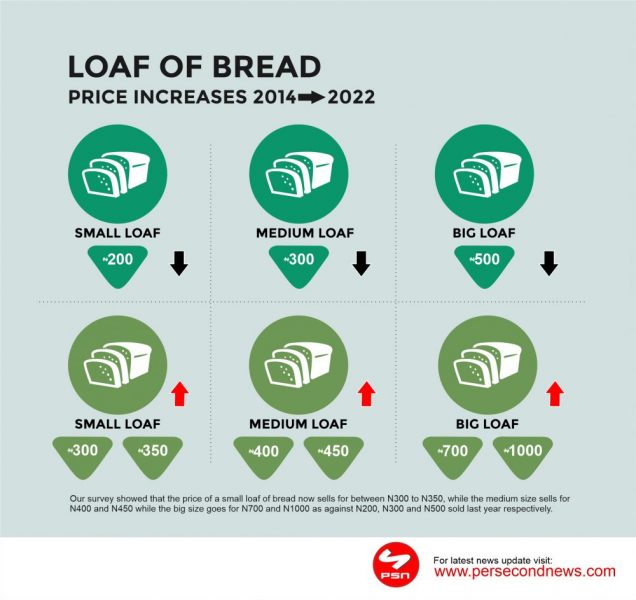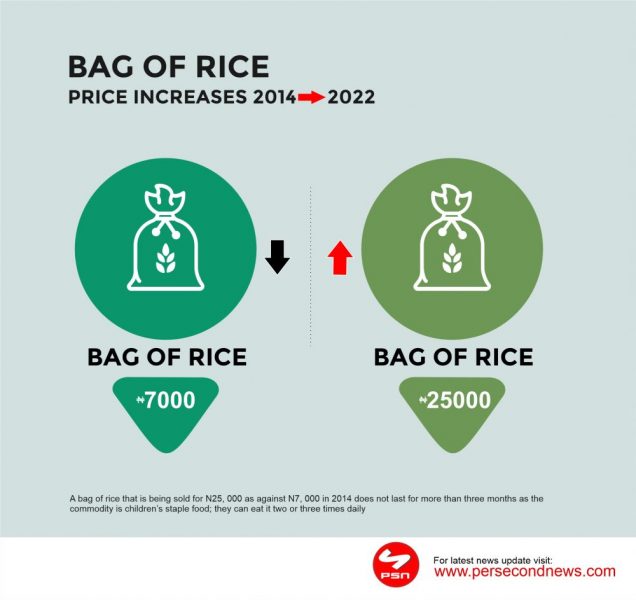Checks by Persecondnews revealed that the quantity of most sachet beverages and food items such as milk, Milo, Bournvita, coffee, satchet tomatoes among others have also been reduced by manufacturers.
Rising food prices on week-to-week basis has become the new normal in Nigeria. Nigerians can’t help but groan while painstakingly paying for staple foods or beverages due to the sharp inflation of the prices of these commodities. Unfortunately the manufacturing sector seems to be handicapped in helping the situation as they are facing several challenges that had continuously affected their productivity.
Prior to the COVID-19 pandemic, the sector had suffered mainly from the closure of land borders in September 2019 by the Buhari administration which drastically reduced food importation. The manufacturing sector is also facing more challenges as operators have come under a renewed wave of inflation and foreign exchange scarcity.
This development, according to the sector leaders, was already taking heavy tolls on the manufacturing companies and it has now been complicated by an increasing difficulty in getting foreign exchange to import foreign components or raw materials for their production, as well the decade-long problem of interrupted power supply.
According to World Bank 2021 report, businesses in Nigeria lose about US$29 billion annually due to the country’s unreliable electricity. The Manufacturers Association of Nigeria (MAN) also confirmed that inadequate electricity supply and the high cost of alternative energy sources are the topmost challenges hampering the performance and growth of the sector, adding that other challenges such as port congestion, logistics, bottlenecks are also important factors limiting the performance of the sector.
Allied to these is the ongoing Russia’s invasion of Ukraine with oil prices surging above $100 per barrel. Unlike Premium Motor Spirit (PMS), Diesel has been deregulated for the past 10 years and as such, the surge in global oil prices has led to an increase in diesel price.
According MAN, the situation has resulted in soaring operational costs as most businesses rely on diesel-powered generators in the absence of electricity. Russia and Ukraine are also major exporters of agricultural commodities, particularly grains.
Recall that in 2021, the Central Bank of Nigeria (CBN) discontinued the sales of foreign exchange (FX) to the Bureau de Change (BDC) operators and stopped the approval of BDC license applications. According to CBN, the monetary policy was to create stability and transparency in the FX market. However, rather than create stability and transparency as projected by the apex bank, it led to scarcity thereby making the dollar stronger against the naira. Presently, naira is as high as N610/$1 at the parallel market and N419/$1 at the official market.
Market Survey
Bread, a key staple food in the diet of Nigerians has become a luxury for most households. A market survey by Persecondnews at some bakeries shows that the high cost baking ingredients, especially flour and the use of generator for baking has forced the price of bread to go up almost double with some bakeries reducing their manpower and quantity of bread by 50 percent to keep their business afloat.
A visit to IMC bakery in Kubwa, shows that the bakery was not filled with bread as usual and activities had gone down as it used to a year ago. They produced smaller loaf that was sold for N300.
Most of the ingredients we use in making bread have doubled in price because they are mainly imported. Because the naira to dollar exchange rate is now very high, importing these materials into the country is also very expensive.
The price of bag of flour keeps increasing every week. A 50kg bag of flour we use to buy for N16,000 back then kept increasing until we got tired of complaining and got used to the increment.
As I talked to you right now, we buy 50kg bag of flour for N29,000. We are buying a bag of sugar for N28,500, not to talk about other ingredients.
There is also the issue of light. We bake more with generator because the electricity situation in the country is nothing to write home about. And of course we don’t use water to power the generator set, we use diesel.
Because of the high cost of diesel, we had to reduce our production output to twice a day and sometimes even once a day.
Based on demand, we also had to produce more of the small bread with sells N250 than the bigger ones which sells for N500,” the manager of the bakery, who gave his name simply as Justice told Persecondnews.
The survey showed that the price of a small loaf of bread now sells for between N300 to N350, while the medium size sells for N400 and N450 while the big size goes for N700 and N1000 as against N200, N300 and N500 sold last year respectively.

Some bread vendors and retail shop owners also complained about low profit and patronage.
A bread vendor who sells under the Gwarimpa pedestrian bridge, Nurudeen Musa said he had to reduce the quantity of bread he buys to sell due to the high price of bread to avoid having too many unsold loaves.
The price of bread has gone up so much that customers keep complaining when you tell them the price. Some of them think we are the ones adding so much money, not knowing that the fault is not from us. We are not making so much profit like we used to before.
“Because of the price, I don’t even buy much, so I can sell almost all, because I don’t like selling left overs of the previous day as they sometimes become strong and customers won’t buy them,” he said.
Consumers groan
With the ongoing challenges facing the manufacturing industries, consumers are mostly at the receiving end. Most consumers are complaining about the increase in food items, and the quantity and quality of most them especially sachet beverages reducing.
Before now, I use to use make tea for my two kids using one sachet of milk and milo, but I can’t do that now because there is barely anything inside the sachet now and the same goes for Golden morn. My daughter could hardly finish one full sachet of Golden morn before, but now it doesn’t take her time to finish one. When I make tea before, I use just a cube of sugar but now I use two cubes or even three depending on the brand of the sugar.
“The price of everything has gone up, but the annoying thing is that the quantity and quality have dropped. If they are increasing the price, at least the quantity and quality should be intact,” a tailor, Chioma Chike, lamented.
Another person who also spoke with Persecondnews bemoaned the economic hardships in the country as she prayed the next government would make things easy for Nigerians.
I don’t know where this country is headed. The country is in a mess, I sometimes wonder how people with very little or low income survive. Imagine bread and tea that used to be one of the cheapest food to take for breakfast now being a luxury.
How many sachets of beverage will a family buy to make a cup of tea? Imagine milk and Milo or Bournvita that was sold for N40 a sachet, now N80. And the worse thing is that one is not even enough for a full cup of tea. Even to cook a pot of rice, you can’t use one sachet tomatoes anymore, you need at least two or three, and the price is also nothing to write home about,” a civil servant Blessing Okon recounted her experience.
In Abeokuta, Ogun State capital, Ajibike Olusola, said she almost 90 per cent of her earnings is being spent on food to feed the family, lamenting high cost of food items and commodities generally.
Olusola, who said she bought six cubs of maize for N500 recently at Siun near Abeokuta recently, wondered that even maize from the farms is expensive.
Mr Peter Ejiofor, a senior journalist, told Persecondnews in Egbeda, Lagos: “Things are unreasonable too expensive”. N5, 000 is not enough to cook stew for a family of six and if we decide to manage it, it will last more than two days.
Federal and state governments are just paying lip service to agriculture. Even local rice is more expensive than imported rice that is if you get it to buy.
“A bag of rice that is being sold for N25, 000 as against N7, 000 in 2014 does not last for more than three months as the commodity is children’s staple food; they can eat it two or three times daily.’’

MAN addresses challenges
A survey conducted by the Manufacturers Association of Nigeria (MAN) on over 400 Chief Executive Officers (CEOs) of its member-companies tagged, “Manufacturers CEO’s Confidence Index (MCCI) Survey Q1 2022’’, shows that the confidence index of CEOs in the manufacturing sector declined by 1.5 points to 53.9 points in Q1’22 from 55.4 points recorded in Q4’21, indicating lowering confidence in the economy.
Persecondnews reports that MCCI is an index constructed by MAN to measure changes in the quarterly pulsation of manufacturing activities in relation to movement in the macro-economy and government policies.
The MAN’s survey report states: “Contributory factors to the decline in the index score for Q1’22 include eroding disposable income of consumers, high interest rate, excessive drive for revenue by government, obvious neglect of the economy for politics, the persistent acute shortage of Forex; insecurity, the immediate impact of the Russian invasion of Ukraine as seen in the hike in price of diesel, wheat and other imported manufacturing inputs”.
Although the Q1’22 MCCI index score of 53.9 points fell below that of Q1’21, the overall result shows that even though the economy recorded positive improvement despite unstable macroeconomic fundamentals, the manufacturing sector is still largely under severe pressure, its health very well in the fringes and below the desired performance threshold.
“In addition, feedbacks from manufacturers identified limited supply of electricity; high cost of local and imported raw-materials; persisting acute shortage of forex for importation of machine, raw materials not available locally and persisting insecurity in the country as the first out of the challenges limiting the performance of the manufacturing sector in the period under review.”
The Manufacturing Association of Nigeria (MAN) has revealed that its members in the country spent a total of N71.22 billion on buying diesel for alternative power in 2021.
It noted that members saved N10.69 billion on this cost compared to N81.91 billion expenditure in 2020.
The President of MAN, Engr. Mansur Ahmed who disclosed this recently in Lagos, noted that the cost of providing alternative power was still very high.
According to him, the average daily supply of electricity has been stable at 11 hours and power outage, three times per day respectively.
He lamented that billions spent on energy has threw manufacturing cost structure overboard, eroded working capital and impacted on capacity utilization.
In summary, it caused the loss in production and ate into the bottom line.
“Between July and December, 2021 in the sector, expenditure on alternative energy source dipped to N45.04 billion from N57.75 billion recorded in the corresponding half of 2020. The drop indicates N12.71 billion or 22.0 per cent decline over the period. It is however an increase of N12.86 billion or 40 per cent over N32.18 billion of the preceding,” he noted.
On the alternative energy source implications, the industrialist said: “Since the average Nigerian’s disposable income has been depleted, we can only expect that the resulting higher prices of goods will further constrain purchases and aggravate the poverty level.”
Speaking on access to foreign exchange, a member of MAN who pleaded anonymous, in a phone interview with Persecondnews said: “The current food inflation in Nigeria is partly as a result of the fluctuating exchange rate. When you import goods, you need foreign currency to pay the seller, and the scarcity of dollars makes goods more expensive.
“In the domestic market, producers need dollars to facilitate factors of production. When dollars becomes costly because of CBN restrictions, consumers will pay more for these goods.”
NBS report on importation
According to the recently published capital importation report, released by the National Bureau of Statistics (NBS), the total value of capital importation into Nigeria in the first quarter of 2022 stood at US$1,573.14 million from US$2,187.63 million in the preceding quarter showing a decrease of 28.09%.
Nigeria attracted a total of $1.57 billion in capital inflows in the first quarter of 2022, falling by 28.1% compared to $2.19 billion recorded in the previous quarter.
Compared to the corresponding period of 2021, Nigeria’s capital importation declined by 17.46% from $1.91 billion received in Q1 2021.
Way forward
As a way forward, MAN called for the establishment of a National Response and Sustainability Strategy (NRSS) as a survival plan for the sector.
The general decline in the index point and the dimmed outlook for the second quarter evidenced by expectations of lower production, employment and unfriendly business conditions is a cause for concern.
“Undoubtedly, the precarious situation that the manufacturing sector is currently in and the looming dangers ahead call for the crafting of a National Response and Sustainability Strategy to guarantee the survival of the sector and avoid further de-industrialisation,” MAN declared.
It must be pointed out that the CPC is established under Consumer Protection Council Act, Cap 25, 2004 Laws of the Federation of Nigeria amended in 2020 is not doing enough to protect Nigerian consumers.
Among others, the council is to promote and protect the interest of consumers over all products and services. In a nutshell, it is empowered to eliminate hazardous and substandard goods from the market.
Also under the Act the eight consumer rights are listed as follow: The right to satisfaction of basic needs – to have access to basic, essential goods and services such as adequate food, clothing, shelter, health care, education, public utilities, water and sanitation.
However, there appears to be a ray of hope as President Buhari has promised at a recent meeting with MAN that appropriate measures would be taken to enhance access to foreign exchange for the importation of raw materials and machines that are not readily available locally.
























Leave a comment